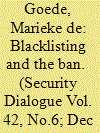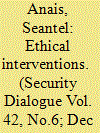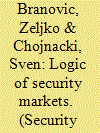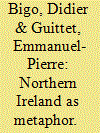| Srl | Item |
| 1 |
ID:
110775


|
|
|
|
|
| Publication |
2011.
|
| Summary/Abstract |
This article examines the practice of targeted sanctions as they are deployed against individuals and groups suspected of financing and facilitating terrorism in Europe. Substantial academic attention and critique has surrounded targeted sanctions and blacklists, as these practices challenge existing logics of evidence, criminal culpability and proportionality. This article seeks to move the analysis of blacklisting beyond the breach of individual rights and toward an understanding of the wider political implications. It draws upon the work of Giorgio Agamben to offer a reading of blacklisting in terms of its symbolic function of banishment and exclusion, which simultaneously redraws the boundaries around normal, valued, ways of life. The article teases out the exceptional and pre-emptive nature of blacklisting as a security measure. It analyses in some detail the Kadi case before the European Court of Justice, and argues that blacklisting and its current contestations work to inscribe the principles of pre-emption into the international juridical order.
|
|
|
|
|
|
|
|
|
|
|
|
|
|
|
|
| 2 |
ID:
110777


|
|
|
|
|
| Publication |
2011.
|
| Summary/Abstract |
This article employs some of the theoretical and methodological tools devised by Michel Foucault to explore the political rationale suggested by the proliferation and use of a class of weapons collectively referred to as 'non-lethal'. The invention and continued use of non-lethal weapons has been treated in existing literature as an ethical crisis. This article connects the emergence of non-lethal weaponry to the mobilization of a sense of ethical crisis concerning the humane treatment of civilians and combatants in conflicts in the United States and beyond. Policies related to non-lethal weaponry, along with the practices that they engender, are also explored in relation to the notion of 'partial citizenship'. Offering a contribution to the genealogy of non-lethal weapons, this article traces their involvement in the policing by US military agents of a variety of sites, actors, and contexts outside of the theater of war.
|
|
|
|
|
|
|
|
|
|
|
|
|
|
|
|
| 3 |
ID:
110778


|
|
|
|
|
| Publication |
2011.
|
| Summary/Abstract |
This article presents a theoretical framework with which to discuss how non-state modes of security governance evolve in the context of state failure and/or collapse. To address this issue, we present the logic of security markets, which assumes that the evolution of security governance by non-state groups in failed states is a function of both resource availability and the strategies that armed groups apply to extract resources from the civilian population. Axiomatically, we expect that in the short term the central purpose for the use of force is survival and achieving the ability to finance one's capabilities to use force, although ultimately this also includes the seizure and control of territory. The main argument is that the changing competitive conditions in security markets - which we measure in terms of the total number of violent groups and their organizational design, size and strength - explain the rationales behind the decisions of armed groups either to use violence against the civilian population or to invest in the provision of security.
|
|
|
|
|
|
|
|
|
|
|
|
|
|
|
|
| 4 |
ID:
110774


|
|
|
|
|
| Publication |
2011.
|
| Summary/Abstract |
This article questions the fashionable view that Northern Ireland is a counterinsurgency lesson to be learned for the global 'war on terror'. It suggests that Britain's involvement in the Northern Ireland conflict - one of the longest conflicts within Europe in which a government has been at war with a clandestine organization - can be regarded as a meaningful metaphoric utterance in efforts to analyse the practical failures and threat discourses of the global 'war on terror'. Northern Ireland is more than a specific case study: it acts as an appealing metaphor in attempts to understand the logics and pitfalls of the 'war against terrorism', where the increasing primacy granted to terror control - present and future - means that Western governments are increasingly more willing to infringe otherwise inviolable rights in the pursuit of a supposed greater good - security. The article explores the political economy of unease, suspicion, exception and radicalization in the 'war against terrorism'. It concludes that Northern Ireland is not a model that can be exported around the globe but an invitation to analyse contingency, daily operations of security, and their effects on social practices and routines. Northern Ireland also represents a remarkable inducement to assess how exception, suspicion and radicalization are correlated, as well as to recognize that efforts to contain the unpredictability of the future are self-defeating.
|
|
|
|
|
|
|
|
|
|
|
|
|
|
|
|
| 5 |
ID:
110776


|
|
|
|
|
| Publication |
2011.
|
| Summary/Abstract |
This article argues that US counterinsurgency doctrine forms a programme of both liberal rule and liberal war whose ultimate purpose is the pacification of recalcitrant populations and their eventual (re)integration into the networks of liberal governance. Designed to promote 'safe' forms of life while eradicating 'dangerous' ones, the doctrine constitutes a response to both the biopolitical problematization of human (in)security and the geostrategic problematization of US national security. Counterinsurgency aims to harness sociocultural knowledge in order to conduct a form of triage between elements of targeted populations. It also seeks to inscribe the divisions on which such a triage is based into space by means of practices that derive from earlier methods of imperial policing. Ultimately, counterinsurgency's production and implementation of a biopolitical differentiation between 'safe' and 'dangerous' human lives is likely not only to reinforce existing societal divisions within targeted populations but also to create new global, regional and local divisions and to generate resistance to what many people will always view as imperial domination. The societal divisions and resistance engendered by counterinsurgency may reinforce Western problematizations of insecurity and hence lead to further counterinsurgency campaigns in the future. Counterinsurgency doctrine is thus not so much a programme of peace and stability as one of spatially and temporally indeterminate pacification.
|
|
|
|
|
|
|
|
|
|
|
|
|
|
|
|